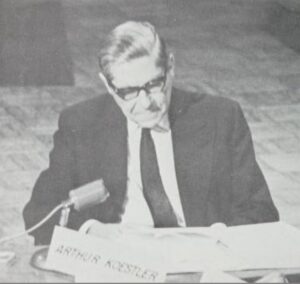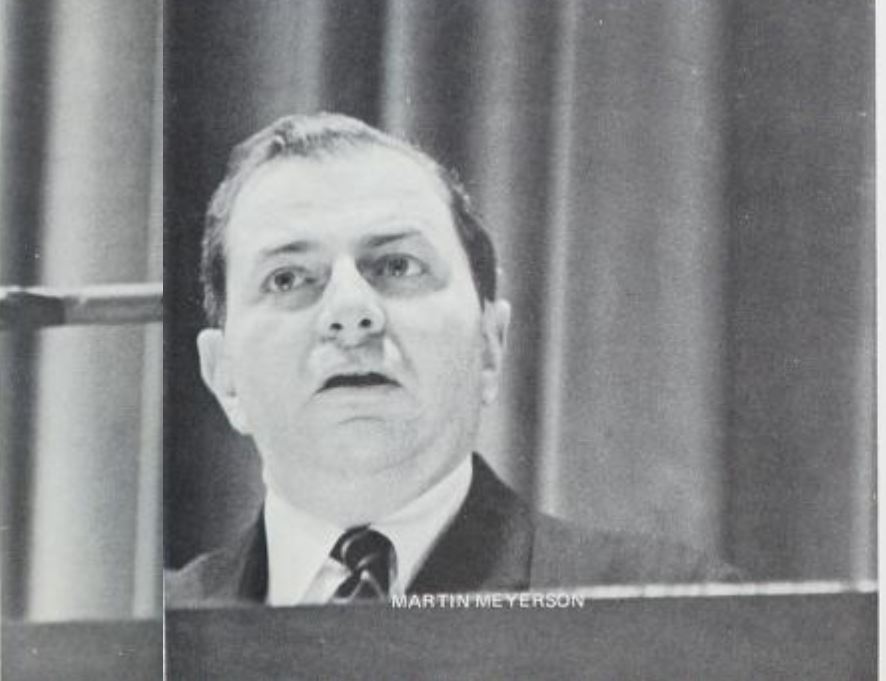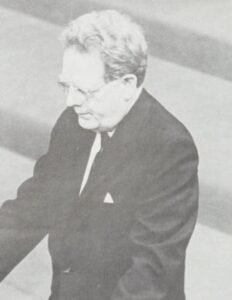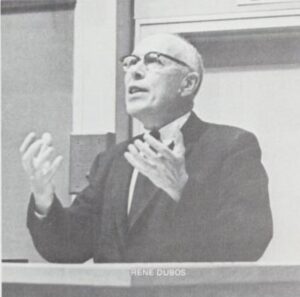To celebrate the installation of Dr. John Deutsch as Queen’s Principal, the Dunning Trust sponsored a symposium on the theme of “The University and the Ethics of Change” with panels featuring Koestler, Rene J. Dubos, Martin Meyerson, and Northrup Frye.
Approximately 6000 tickets were distributed and CBC agreed to tape the programme to be televised on Ideas. Patrick Watson of The Way It Is acted as moderator. Because the audience was so large, several additional halls had to be set up with closed circuit TV to relay the symposium to a wider audience. The speakers dealt with the ethical issues involved in influencing the mind, in influencing the physical environment, and in biological change. They discussed the university’s responsibility to deal with ethical issues.
Arthur Koestler
“Ethical Issues Involved in Influencing the Mind”

Arthur Koestler was a Hungarian-British activist and intellectual. He was trained as a scientist and worked as a journalist. Koestler became a member of the German Communist Party in 1931 and fought in the Spanish Civil War, spending four months imprisoned by the Fascists before he was released through British intervention. He resigned from the Communist party in 1938 and wrote an indictment of modern Communism in Darkness at Noon. His anti-totalitarianism work gained him worldwide fame. At the outbreak of the Second World War, Koestler was arrested by the French police and interned in a concentration camp. In 1949, Koestler began secretly working with a British Cold War propaganda department known as the Information Research Department. He wrote a total of 30 books, including six novels and four autobiographical volumes. Both Koestler and his wife were members of Exit, a British organization agitating for the “right to die with dignity.” He died in 1983 by suicide.
During the symposium, Koestler was on a panel with Dr. John Meisel, chairman of the department of political studies, Dr. E. J. Bond, professor of philosophy, and graduate students Liivi Kasah and Jean Kronberg. An audience of approximately 2000 attended his lecture, where he argued that the ideal role of education should be as a catalyst, not a conditioning influence, in the development of individuals. In the current era of reductionism, ratomorphism, and randomness, it was ever more essential to remember that the point of teaching was not facts and dates but their interpretation.
Martin Meyerson
“Ethical Issues Involved in Changing the Physical Environment”

Meyerson was an authority on urban planning. He was professor of public policy and the president of the State University of New York at Buffalo. Over the course of his career, he worked at a number of universities including Harvard and UC Berkeley. Meyerson authored several books including Politics, Planning and Public Interest and Face of the Metropolis. During his early career in city planning, Meyerson called for the integration of social science and economics. Meyerson was a United Nations advisor and delegate, as well as a consultant to several West African nations and to the Governor of the Tokyo Metropolitan Area. He founded London’s Centre for Environmental Studies and Japan’s International Centre for the Study of East Asian Development. He was an advisor to France’s Institut National de la Communication Audiovisuelle. He chaired the International Institute for Education and was President of the International Association of Universities. He held leadership positions with many US organizations dedicated to urban affairs, education, science, foreign policy, conservation, and the arts. He served on several White House task forces and on the councils of government agencies. He was also decorated by the governments of France, Italy, and Japan. He received numerous prizes and held over 20 honorary degrees, including a doctor of laws degree conferred by Penn in 1970.
During the symposium, Meyerson appeared on a panel with Dr. D.A. Soberman, dean of law, Dr. Stanley Lash and Graham Andrews, professors of civil engineering, Craig Callon-Jones, law student, and Miss Gail Ferguson, a political science student. These was a great deal of interest in his speaking engagements because Queen’s was discussing the establishment of a school of urban and regional planning at the time. In his lecture, Meyerson said that city planners didn’t realize that their perception of the public interest was class-bound, resulting in planning programs that affected the shape of the urban environment unintentionally having large discrepancies between their purposes and their benefits. For example, he criticized the project of urban renewal and its focus on ‘slum clearance’ as being identical to, in the United States, ‘Black clearance,’ making room for middle-class populations.
Northrup Frye
The Ethics of Change -The Role of the University

Northrup Frye was a Canadian scholar of English literature. His literary criticism made him one of the most influential literary theorists of the twentieth century. He authored more than 20 books, hundreds of articles and book chapters and was been a professor of English at half a dozen universities. At the time of his lecture, he was University Professor at the University of Toronto and a Fellow of the Royal Society of Canada. Frye studied at the University of Toronto (Victoria College and Emmanuel College) before being ordained as a minister in the United Church of Canada. His influential book, Anatomy of Criticism (1957), eschewed analysing individual pieces of literature to focus instead on the recurrent and deeper imaginative patterns and archetypes that all literature is built upon. Frye was especially influential in the theorization of Canada, describing a “garrison mentality” that he believed was uniquely Canadian. His work in this stream was collected in the 1971 book The Bush Garden: Essays on the Canadian Imagination. Frye defined Canadian identity as fear of nature and adherence to the community, however, he also proposed the possibility of movement beyond the literary constraints of the garrison mentality: growing urbanization, interpreted as greater control over the environment, would produce a society with sufficient confidence for its writers to compose more formally advanced detached literature
Frye’s was the final session of the symposium, with Dr. Deutsch acting as chair. His lecture focused on the role of the university in society. Frye’s lecture was primarily concerned with the pressure groups acting on the university, both from within and without the institution, and the resulting confrontations. Despite these, he emphasized the need for a renewed loyalty to logical argument, repeatable experiment, established fact, and compelling works of art within the university and society more broadly. While this loyalty was not sacrosanct – what is true today may be inadequately true tomorrow – it is what holds society together for the moment.
Rene Dubos
“Ethical Issues Involved in Genetic Manipulation and Biologic Conditioning”

Rene Dubos was a distinguished professor of pathology at the Rockefeller Institute for Medical Research. Dubos was a microbiologist, experimental pathologist, human ecologist, historian and social philosopher, and a significant figure in the development of antibiotic drugs. He carried a deep interest in the social effects of such research, dedicating the later years of his career to exploring the interplay of environmental forces and human social and cultural life. He is credited with originating the environmental slogan “think globally, act locally,” which suggested that global environmental issues can only be solved by attention to our immediate surroundings. He won many awards for his contributions, and was a graduate of Rutgers University and l’Institut National Agronomique de Paris.
In his lecture, Dubos discussed the ethical issues in genetic manipulation and biological conditioning. He maintained that the environment plays a larger role in shaping the physical and mental states of future generations than the limited amount of minor genetic changes currently possible. Diversity and freedom were the most significant factors in environmental change, and so humans must change their priorities to provide stimulus for a variety of different human designs in the future.